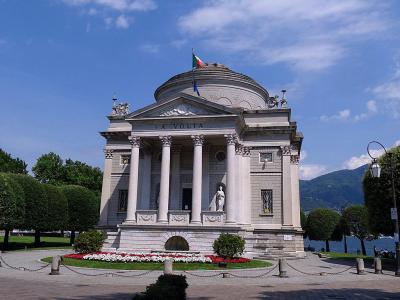Tempio Voltiano (Volta Temple), Como (must see)
Francesco Somaini, owner of a cotton mill in Como and Member of Parliament, had the idea of building a place devoted to the memory of Alessandro Volta, the great physicist and inventor of the electrical battery, to preserve his scientific tools and documents. Somaini had seen the fire that destroyed much of the Great Exhibition pavilions in 1936. The fire took with it artifacts associated with the works of Alessandro Volta.
Somaini had the resources, and architect Federico Frigerio started the project "to honor a man who was among the brightest glories of the Napoleonic era." He designed the building in a Neoclassic architectural style. The Volta Temple museum was illustrated on the 10,000 Liras bill.
The museum building was completed in 1927 to commemorate the 100th anniversary of the scientist's death. It was donated to the city by Francesco Somaini. The Volta Temple is located on the beautiful lakefront of Como, between the War Memorial and the Monument to European Resistance.
It has a raised portico supported by six free-standing fluted Corinthian columns inspired by the Pantheon of Agrippa in Rome. There is a triangular pediment above the portico. A cylindrical dome covers the main chamber. The museum hosts a collection of instruments used by Volta, including his voltaic piles (batteries).
Somaini had the resources, and architect Federico Frigerio started the project "to honor a man who was among the brightest glories of the Napoleonic era." He designed the building in a Neoclassic architectural style. The Volta Temple museum was illustrated on the 10,000 Liras bill.
The museum building was completed in 1927 to commemorate the 100th anniversary of the scientist's death. It was donated to the city by Francesco Somaini. The Volta Temple is located on the beautiful lakefront of Como, between the War Memorial and the Monument to European Resistance.
It has a raised portico supported by six free-standing fluted Corinthian columns inspired by the Pantheon of Agrippa in Rome. There is a triangular pediment above the portico. A cylindrical dome covers the main chamber. The museum hosts a collection of instruments used by Volta, including his voltaic piles (batteries).
Want to visit this sight? Check out these Self-Guided Walking Tours in Como. Alternatively, you can download the mobile app "GPSmyCity: Walks in 1K+ Cities" from Apple App Store or Google Play Store. The app turns your mobile device to a personal tour guide and it works offline, so no data plan is needed when traveling abroad.
Tempio Voltiano (Volta Temple) on Map
Sight Name: Tempio Voltiano (Volta Temple)
Sight Location: Como, Italy (See walking tours in Como)
Sight Type: Attraction/Landmark
Guide(s) Containing This Sight:
Sight Location: Como, Italy (See walking tours in Como)
Sight Type: Attraction/Landmark
Guide(s) Containing This Sight:
Walking Tours in Como, Italy
Create Your Own Walk in Como
Creating your own self-guided walk in Como is easy and fun. Choose the city attractions that you want to see and a walk route map will be created just for you. You can even set your hotel as the start point of the walk.
Como Introduction Walking Tour
The Roman writer Pliny the Younger once wrote to his friend, “What is the news from Como, mine and your delight?” Como is a place of palaces, churches, gardens, temples, museums, and parks. Its nearness to the spectacular Lake Como and the Swiss and Italian Alps has made the area a traveler’s delight from the time of Pliny the Younger to the present day.
Pliny wasn’t its first fan,... view more
Tour Duration: 2 Hour(s)
Travel Distance: 2.6 Km or 1.6 Miles
Pliny wasn’t its first fan,... view more
Tour Duration: 2 Hour(s)
Travel Distance: 2.6 Km or 1.6 Miles
Como Lakeshore Walking Tour
English novelist Mary Shelley declared visitors to Italy are in danger of becoming: "enjoyers of the beauties of nature, the elegance of art, the delights of climate, the recollections of the past, and the pleasures of society." All this she found on the shores of Lake Como. From Roman writer Pliny the Younger onward, visitors and natives of Como would have agreed.
The alpine lake is... view more
Tour Duration: 1 Hour(s)
Travel Distance: 2.1 Km or 1.3 Miles
The alpine lake is... view more
Tour Duration: 1 Hour(s)
Travel Distance: 2.1 Km or 1.3 Miles





